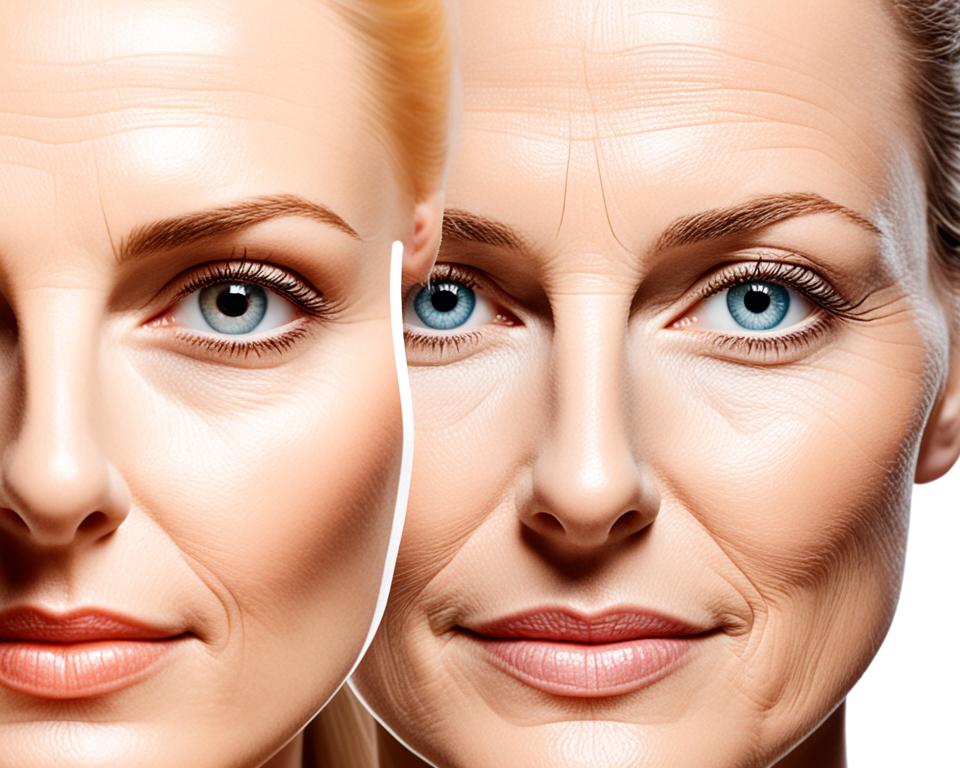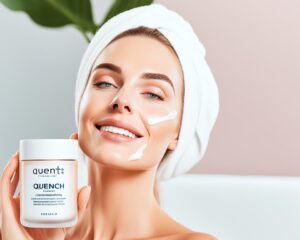Welcome to our guide on the uses and benefits of retinol for achieving healthier, more radiant skin. Retinol is a powerhouse ingredient derived from vitamin A and is renowned for its transformative properties. Whether you are looking to reduce wrinkles, improve skin texture, or treat acne and hyperpigmentation, retinol can help you achieve a complexion you’ll love. In this section, we will delve into the various uses and benefits of retinol, providing you with the knowledge to make informed choices for your skincare routine.
- Retinol, derived from vitamin A, offers numerous benefits for improving skin health.
- Common uses of retinol include reducing wrinkles, improving skin texture, treating acne and hyperpigmentation, repairing sun damage, and brightening the skin.
- Retinol is a versatile ingredient suitable for all skin types, including combination skin.
- To maximize the benefits of retinol, it is essential to follow proper application tips and precautions for safe and effective use.
- Incorporating retinol into your skincare routine can help unlock your best complexion yet.
What is Retinol?
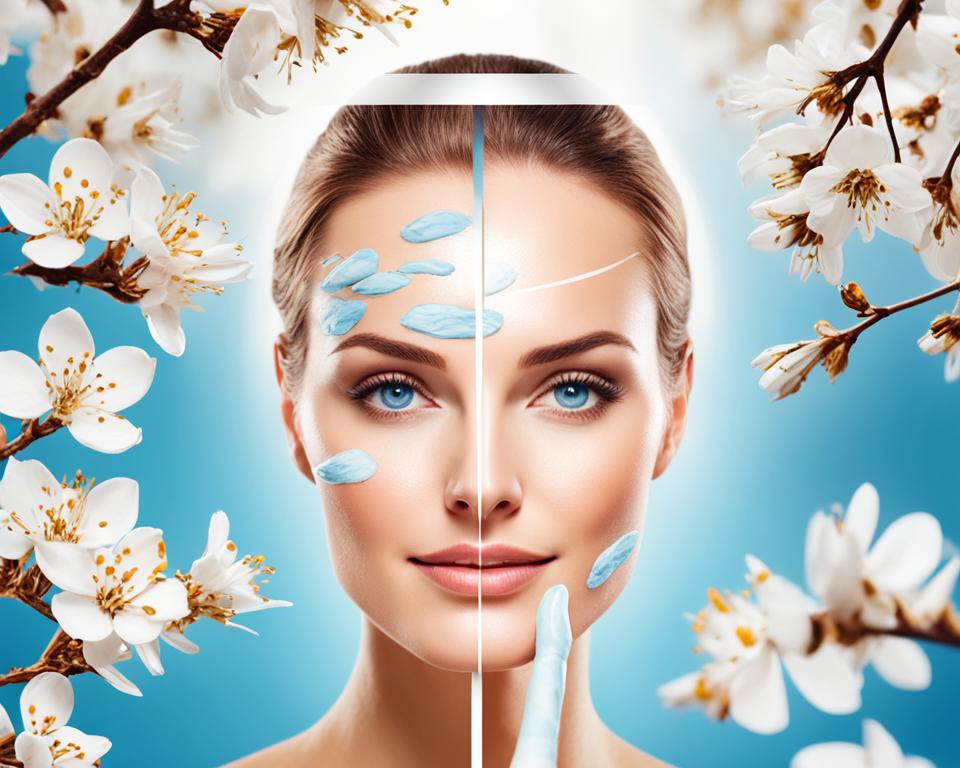
Before delving into the uses of retinol, let’s first understand what retinol is.
Retinol is a derivative of vitamin A and is widely used in skincare products due to its ability to promote cell turnover and stimulate collagen production.
Retinol is a key ingredient in many anti-aging and skincare products, known for its remarkable benefits for the skin. As a form of vitamin A, retinol plays a crucial role in maintaining skin health and vitality.
When applied topically, retinol works its magic by penetrating the skin’s layers and activating the production of collagen. Collagen is a protein that provides structure and elasticity to the skin, keeping it firm and smooth.
In addition to collagen production, retinol also aids in the acceleration of cell turnover. This process involves shedding old, damaged skin cells and replacing them with new, healthy cells. By promoting cell turnover, retinol helps reveal a fresher, brighter complexion and reduces the appearance of dullness, fine lines, and wrinkles.
In summary, retinol is a derivative of vitamin A that exerts transformative effects on the skin. It enhances cell turnover, stimulates collagen production, and ultimately improves the overall health and appearance of the skin.
Retinol for Reducing Wrinkles
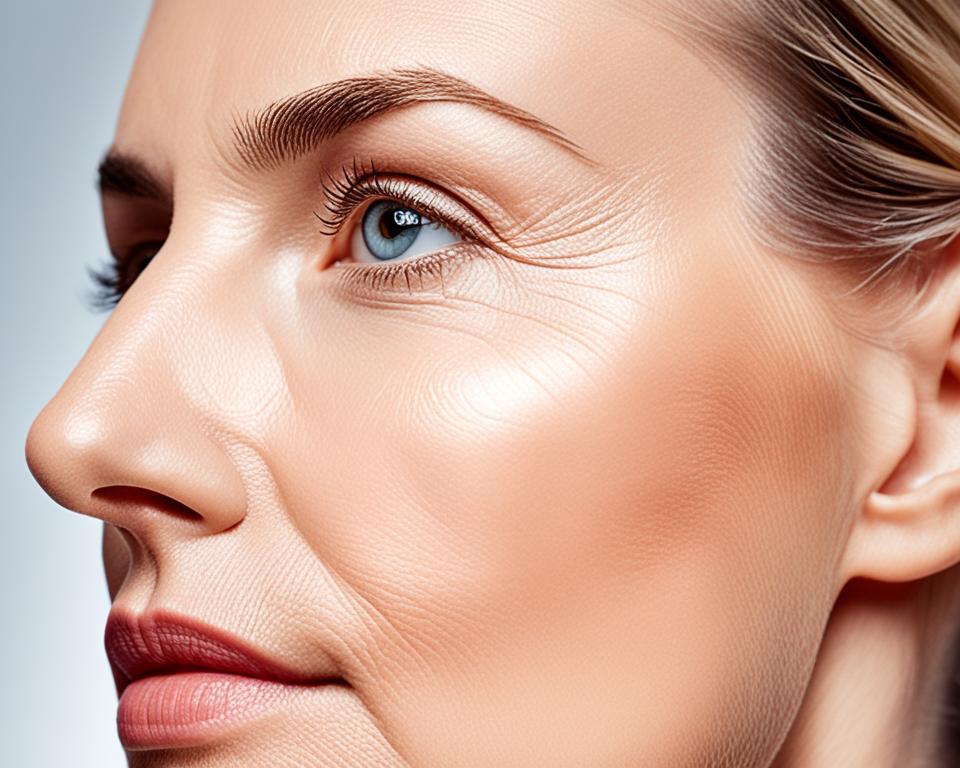
One of the primary uses of retinol is its effectiveness in reducing wrinkles and fine lines. With its remarkable anti-aging benefits, retinol has become a go-to ingredient for those seeking to regain youthful-looking skin.
Retinol works its magic by boosting the production of collagen, a vital protein that gives your skin its structure and elasticity. As we age, collagen production naturally declines, leading to the formation of wrinkles. However, retinol steps in to stimulate collagen synthesis, helping to plump up the skin and smooth out those fine lines over time.
This powerful ingredient also promotes cell turnover, which means that it helps shed dead skin cells and encourages the growth of new, healthy skin. By accelerating the skin’s renewal process, retinol can minimize the appearance of wrinkles and improve overall skin texture.
Reducing fine lines with retinol is a gradual process that requires consistency and patience. While visible results may take a few weeks to manifest, the long-term benefits of incorporating retinol into your skincare routine are undeniable.
“Retinol has been a game-changer for my skin! Not only have I noticed a significant reduction in my wrinkles, but my skin also looks brighter and more youthful.” – Jane, retinol enthusiast
Harness the power of retinol to turn back the clock on aging skin. Include retinol-based products in your daily regimen, such as serums or creams, to experience the remarkable benefits this ingredient has to offer. Remember to start with a lower concentration if you’re new to retinol and gradually increase as your skin becomes accustomed to it.
Unlock smoother, younger-looking skin with retinol and embrace a more confident you.
Improving Skin Texture with Retinol
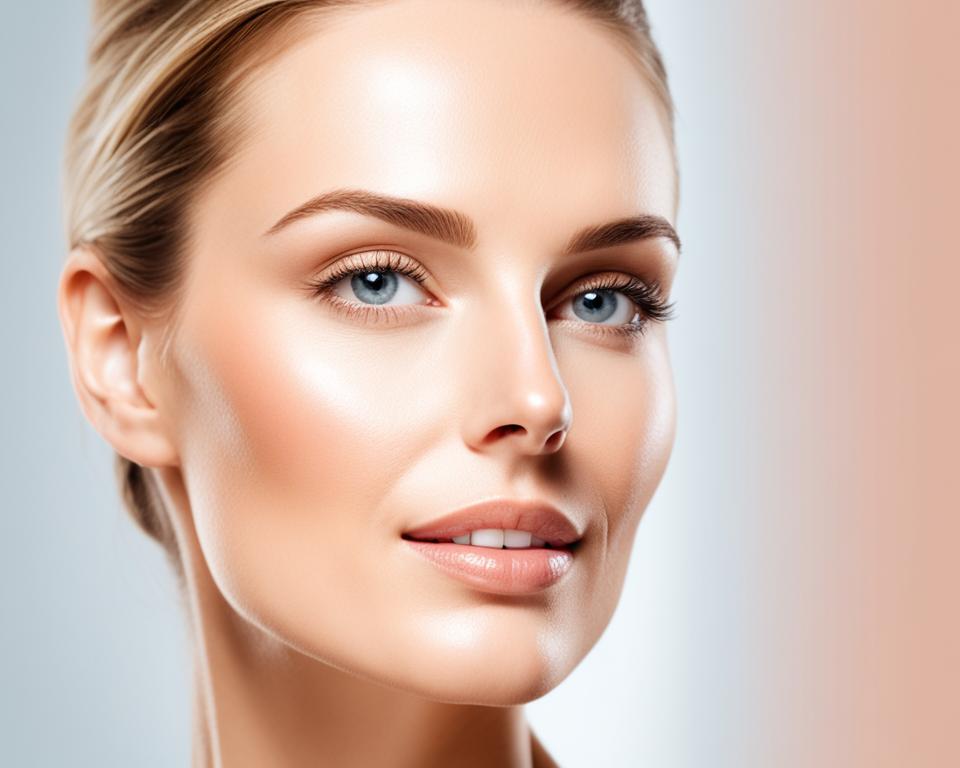
Retinol is a powerhouse ingredient known for its ability to transform skin texture, leaving it smoother and more refined. By promoting cell turnover, retinol helps to slough off dead skin cells and reveal a fresh, youthful-looking complexion underneath.
When applied topically, retinol stimulates collagen production and increases the rate of skin cell renewal. This process not only helps to reduce the appearance of rough and uneven skin but also aids in diminishing the visibility of fine lines and wrinkles.
Retinol is like a reset button for your skin. It works at the cellular level to renew and rejuvenate, resulting in softer and more even skin texture.
Whether you’re dealing with rough patches, bumpy skin, or an overall lack of smoothness, incorporating retinol into your skincare routine can make a noticeable difference.
Here are some key benefits of using retinol for improving skin texture:
- Smoothing rough skin: Retinol helps to remove dead skin cells on the surface, revealing smoother and softer skin.
- Minimizing the appearance of pores: By promoting cell turnover, retinol can help to unclog pores and reduce their visibility, resulting in a more refined and less textured complexion.
- Diminishing acne scars: Retinol’s exfoliating properties can fade acne scars and hyperpigmentation, leading to a more even skin tone and texture.
It’s important to note that retinol can cause some initial dryness or irritation as your skin adjusts to the ingredient. To minimize these side effects, start with a lower concentration of retinol and gradually increase its usage over time. Additionally, always remember to follow up with a moisturizer to keep the skin hydrated and protected.
Image: Retinol for Smooth Skin
With consistent use and proper skincare practices, retinol can be a game-changer for improving skin texture, leaving you with a smooth and radiant complexion.
Retinol for Acne Treatment
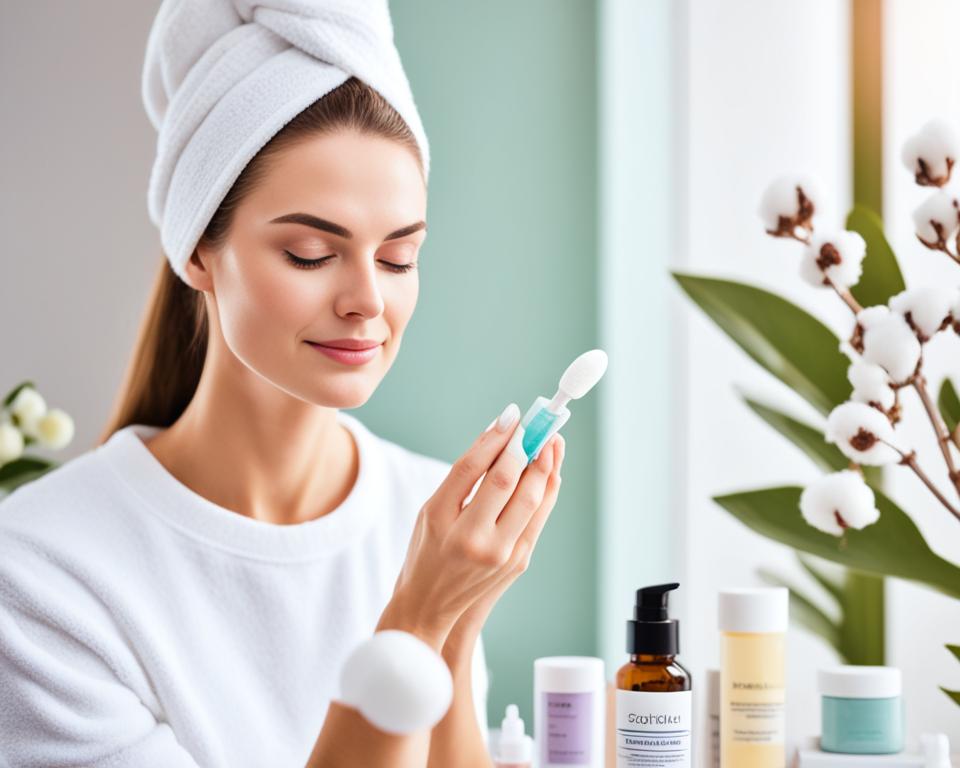
Acne can be a frustrating and confidence-denting skin concern for many. Fortunately, retinol can be a powerful weapon in the fight against acne. Its multitasking properties make it an excellent choice for those seeking an effective treatment for acne, blemishes, and acne scars.
Retinol works wonders in combating acne in multiple ways:
- Unclogs Pores: Retinol helps to unclog pores by removing excess sebum, dead skin cells, and other impurities that can contribute to the formation of acne.
- Reduces Inflammation: The anti-inflammatory properties of retinol can help soothe redness and inflammation associated with acne, promoting a calmer complexion.
- Regulates Oil Production: One of the primary causes of acne is excessive oil production. Retinol helps to regulate the production of oil, preventing the clogging of pores and reducing the likelihood of future breakouts.
- Fades Acne Scars: Acne scars can be a lasting reminder of past breakouts. Retinol’s ability to promote cell turnover can help fade acne scars over time, revealing smoother, more even-toned skin.
Whether you’re dealing with occasional breakouts or chronic acne, incorporating retinol into your skincare routine can make a significant difference. However, it’s important to note that retinol may cause initial purging or skin sensitivity, so it’s recommended to start with a lower concentration and gradually build up tolerance.
To further enhance the effectiveness of retinol for acne, combine it with a consistent skincare routine that includes gentle cleansing, non-comedogenic moisturization, and sun protection.
“Retinol has been a game-changer in my battle against acne. It has helped clear my breakouts, fade my acne scars, and give me the confidence to face the world with healthier, blemish-free skin.” – Emily, retinol user
Ready to introduce retinol into your skincare routine? Check out the table below for a comparison of popular retinol products:
| Product | Retinol Concentration | Key Benefits | Price |
|---|---|---|---|
| Brand A Retinol Serum | 1% | Reduces acne, smooths skin texture | $30 |
| Brand B Retinol Cream | 0.5% | Fades acne scars, evens skin tone | $25 |
| Brand C Retinol Lotion | 0.3% | Regulates oil production, minimizes breakouts | $20 |
Remember, finding the right retinol product for your skin may require some trial and error. It’s essential to choose a product that suits your skin type and addresses your specific acne concerns. Always read product labels, follow instructions, and consult with a dermatologist if you have any questions or concerns.
With the consistent use of retinol and proper skincare practices, you can effectively combat acne and achieve clearer, healthier-looking skin.
Retinol for Treating Hyperpigmentation
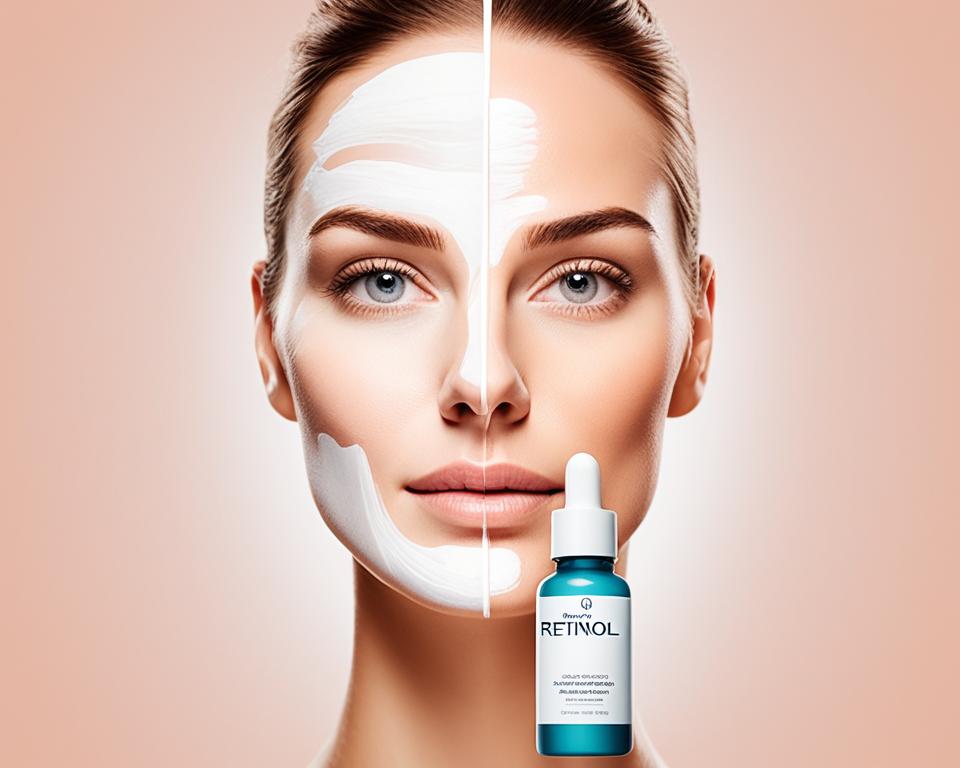
Hyperpigmentation refers to the darkening of certain areas of the skin, often caused by an overproduction of melanin. It can be frustrating and impact self-confidence, but thankfully, retinol can help fade those pesky dark spots and create a more even complexion.
Retinol works its magic by speeding up cell turnover and inhibiting melanin production. As a result, it gradually lightens hyperpigmentation and promotes a more uniform skin tone.
“Retinol effectively tackles hyperpigmentation by increasing skin cell turnover and suppressing melanin synthesis. It’s a game-changer for achieving a more even and radiant complexion.”
By incorporating retinol into your skincare routine, you can address hyperpigmentation and achieve a more balanced and radiant complexion. Whether you’re dealing with post-inflammatory hyperpigmentation from acne scars or sunspots caused by sun damage, retinol can assist in reducing their appearance over time.
How Retinol Helps Treat Hyperpigmentation:
| Benefits of Retinol for Hyperpigmentation | How it Works |
|---|---|
| Fades dark spots | By increasing cell turnover and exfoliating the skin, retinol helps shed the dark pigmented cells, leading to a reduction in dark spots. |
| Inhibits melanin production | Retinol slows down the production of melanin, the pigment responsible for darker areas of the skin, resulting in a more even complexion. |
| Promotes a brighter skin tone | With its exfoliating properties, retinol helps reveal fresh, healthy skin cells and improves overall skin tone, making it appear brighter and more vibrant. |
It’s important to note that retinol can be potent and may cause skin sensitivity. Start with a low concentration and gradually increase as your skin adjusts. Always wear sunscreen during the day when using retinol, as it can make your skin more sensitive to the sun’s harmful rays.
Remember, patience is key when using retinol to treat hyperpigmentation. Results may take time, but with consistent use, you can achieve a more even skin tone and diminish the appearance of dark spots.
Retinol for Sun Damage Repair
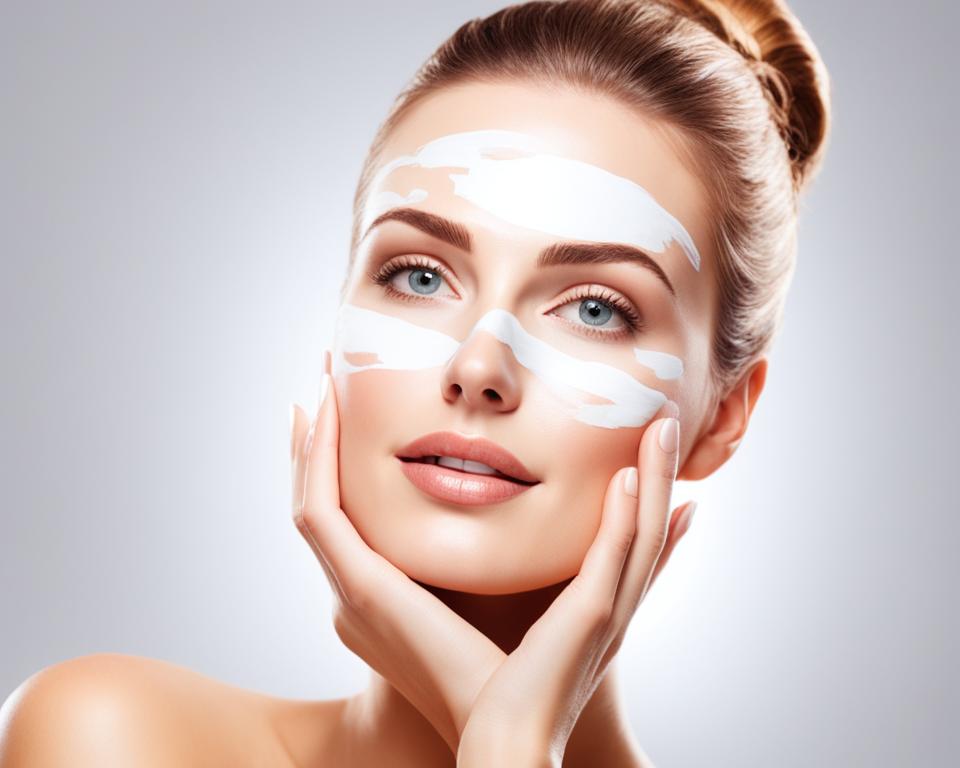
Sun damage can have detrimental effects on the skin, leading to premature aging, hyperpigmentation, and a dull complexion. However, there is a solution to help repair and rejuvenate sun-damaged skin: retinol.
Retinol, a derivative of vitamin A, is renowned for its ability to stimulate collagen production and accelerate cell renewal. These properties make retinol a powerful ally in repairing skin damaged by harmful UV rays.
How Does Retinol Repair Sun Damage?
When applied topically, retinol works on a cellular level to undo the effects of sun damage. It aids in the production of collagen, a crucial protein that helps maintain skin elasticity and smoothness. By promoting collagen synthesis, retinol helps minimize the appearance of fine lines, wrinkles, and other signs of sun-induced aging.
Furthermore, retinol accelerates the shedding of damaged skin cells and encourages the growth of new, healthy skin cells. This process helps to fade sunspots and discoloration caused by prolonged sun exposure, resulting in a more even and radiant complexion.
The Benefits of Retinol for Sun Damage Repair
The key benefits of using retinol for sun damage repair include:
- Stimulating collagen production to improve skin elasticity and firmness.
- Accelerating cell turnover to fade sunspots and discoloration.
- Reducing the appearance of fine lines and wrinkles caused by UV damage.
- Creating a smoother and more even skin tone.
How to Incorporate Retinol Into Your Skincare Routine
When using retinol to repair sun damage, it’s important to start slow and gradually increase the concentration to avoid potential irritation. Begin by using a low-strength retinol product a few times a week and gradually build up to daily use.
Here are some tips for incorporating retinol into your skincare routine:
- Cleanse your face thoroughly before applying retinol to ensure maximum absorption.
- Apply a pea-sized amount of retinol to your face, avoiding the delicate eye area.
- Start with a lower concentration of retinol (0.1% or less) and gradually increase as tolerated.
- Always follow with a moisturizer to help minimize dryness and peeling.
- Apply retinol at night, as it can increase your skin’s sensitivity to sunlight.
- Wear sunscreen daily to protect your skin from further sun damage.
Remember, it’s essential to consult with a dermatologist or skincare professional before incorporating retinol into your routine, especially if you have sensitive or reactive skin.
By harnessing the power of retinol, you can repair and rejuvenate your skin, reversing the damage caused by sun exposure. With consistent use, retinol can help restore a youthful, radiant complexion and promote overall skin health.
Retinol for Brightening the Skin

If you’re looking to achieve a brighter, more radiant complexion, incorporating retinol into your skincare routine can be a game-changer. With its transformative properties, retinol can help you achieve a luminous and glowing skin tone.
Retinol works wonders when it comes to brightening the skin by promoting cell turnover and reducing the appearance of dark spots. By speeding up the skin’s natural exfoliation process, retinol helps slough off dull, dead skin cells, revealing a fresh and vibrant complexion.
Furthermore, retinol is known for its ability to fade hyperpigmentation and even out skin tone. Whether you’re dealing with sun spots, acne scars, or uneven pigmentation, retinol can help diminish these imperfections, leaving you with a more uniform and radiant complexion.
Embracing retinol as part of your beauty regimen can bring about remarkable results. Over time, you’ll notice a brighter, more youthful-looking complexion that exudes a healthy glow.
“Retinol has been a game-changer for me. It has helped me achieve a bright and radiant complexion that I’ve always desired. My skin looks more even-toned and youthful.” – Emma, retinol enthusiast
How to Incorporate Retinol for Brightening
When it comes to using retinol for brightening the skin, it’s important to start gradually to avoid any potential skin irritation. Begin by introducing a low-concentration retinol product into your routine and gradually increase the frequency and strength as your skin adjusts.
Here are some tips for incorporating retinol into your skincare routine:
- Apply retinol products in the evening, as they can make your skin more sensitive to sunlight.
- Start with a pea-sized amount of retinol and gently massage it onto clean, dry skin.
- Allow the retinol to fully absorb before applying moisturizer or any other skincare products.
- Always use sunscreen during the day to protect your skin from UV damage.
- Consider using retinol every other night, especially if you have sensitive skin, and gradually increase the frequency as tolerated.
With consistent use and proper application, retinol can help you achieve a brighter and more radiant complexion, allowing your natural beauty to shine through.
Retinol for Combination Skin
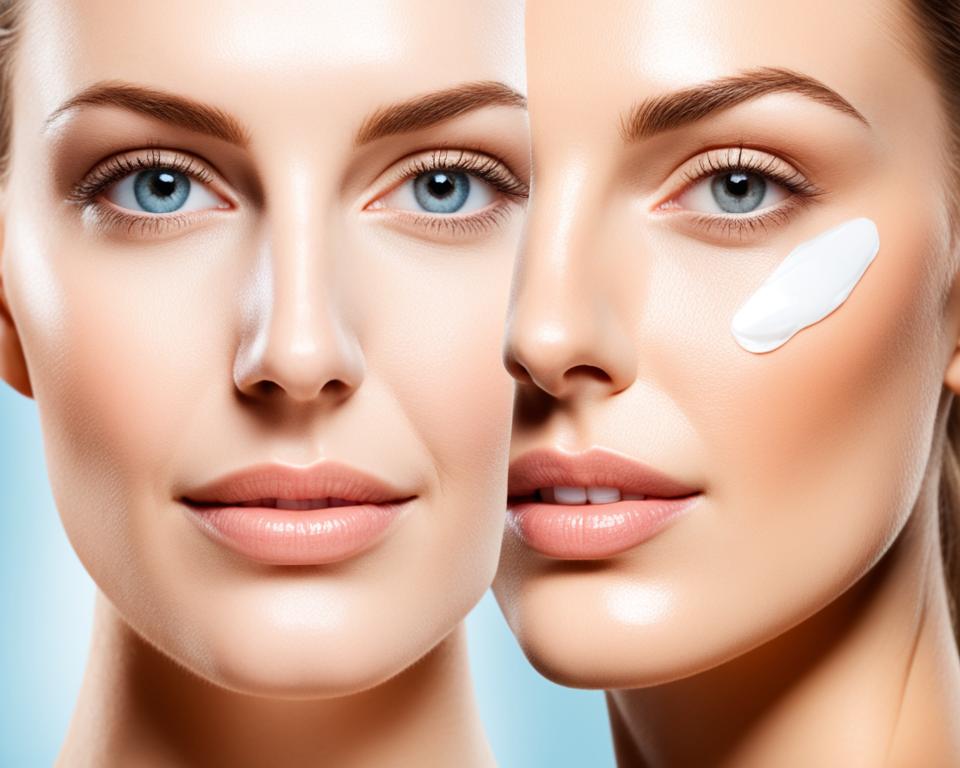
If you have combination skin, you know the struggle of dealing with both oily and dry patches. Finding the right skincare products can be challenging, but retinol is here to save the day. Its multitasking properties make it an ideal solution for balancing your skin’s needs.
Retinol works wonders for oily skin by regulating sebum production. It helps minimize excess oil and prevent clogged pores, reducing the risk of breakouts. At the same time, retinol is equally effective in addressing dry patches. By promoting cell turnover and enhancing skin hydration, it smooths and moisturizes the areas prone to dryness.
When using retinol for combination skin, it’s important to pay attention to product formulation. Look for lightweight and non-comedogenic options that won’t exacerbate oiliness or cause further dryness. Incorporating retinol into your skincare routine can help you achieve a harmonious balance of oil control and moisturization.
Tips for Using Retinol on Combination Skin
- Start with a low-concentration retinol product to allow your skin to adjust gradually.
- Apply retinol in the evening, as it can make your skin more sensitive to sunlight.
- Use a gentle cleanser to remove excess oil and impurities before applying retinol.
- Follow up with a lightweight moisturizer to prevent dryness.
- Don’t forget your sunscreen during the day to protect your skin from UV damage.
“Retinol has been a game-changer for my combination skin. It helps keep my oily T-zone in check while also hydrating my dry cheeks. It’s like a one-stop solution for all my skin concerns!” – Sarah, avid retinol user
By incorporating retinol into your skincare routine, you can achieve a balance between controlling excess oil and replenishing moisture in your combination skin. Embrace the transformative powers of retinol and unlock a complexion that’s both radiant and harmonious.
Retinol Application Tips and Precautions
To get the most out of retinol, it’s essential to know how to apply it correctly and understand any precautions. Follow these tips to use retinol safely and effectively:
1. Start Slowly
When incorporating retinol into your skincare routine, start with a low concentration and gradually increase it over time. This allows your skin to adjust and minimizes the risk of irritation.
2. Use at Night
Retinol is best applied at night as it can make your skin more sensitive to sunlight. Apply a thin layer of retinol after cleansing and toning, and follow with a moisturizer.
3. Use on Dry Skin
Apply retinol on dry skin to minimize potential irritation. Wait for your cleanser and any toners to fully dry before applying retinol to avoid dilution or unwanted reactions.
4. Avoid Sensitive Areas
Avoid applying retinol near the eyes, lips, and any other sensitive areas. These areas are more prone to irritation, and retinol can be too strong for them.
5. Moisturize and Protect
After applying retinol, follow with a moisturizer to hydrate your skin and lock in the retinol’s benefits. In the morning, apply sunscreen with at least SPF 30 to protect your skin from UV damage.
“Starting with a low concentration and gradually increasing it over time is key when using retinol. This helps minimize any potential skin sensitivities.” – Dr. Samantha Miller
Remember, everyone’s skin is unique, so it’s essential to listen to your skin’s needs. If you experience excessive dryness, redness, or irritation, reduce the frequency of retinol application or consult a dermatologist for personalized guidance.
Precautions
While retinol has numerous benefits, it’s important to take a few precautions:
- Avoid using retinol if you are pregnant, breastfeeding, or planning to become pregnant, as it may pose risks to the baby.
- If you have sensitive skin or a skin condition such as eczema or rosacea, consult a dermatologist before using retinol to minimize potential irritation.
- Retinol can make your skin more sensitive to sunlight, so always wear sunscreen when using retinol during the day.
By following these application tips and precautions, you can safely and effectively incorporate retinol into your skincare routine and achieve the desired results.
| Retinol Application Tips | Retinol Precautions |
|---|---|
| – Start slowly with a low concentration | – Avoid retinol if pregnant or breastfeeding |
| – Apply at night on dry skin | – Consult a dermatologist for sensitive skin |
| – Avoid sensitive areas | – Wear sunscreen during the day |
| – Moisturize after application |
Conclusion
In conclusion, retinol is a powerful ingredient that offers a multitude of uses and benefits for improving skin health. Whether you want to reduce wrinkles, improve texture, treat acne, or address hyperpigmentation, retinol can be a game-changer in your skincare routine. The transformative properties of retinol, derived from vitamin A, can unlock your best complexion yet.
However, it is important to use retinol with caution. Incorporate it gradually into your routine to allow your skin to adjust, starting with a lower concentration and gradually increasing frequency and strength. Applying retinol at night is recommended to minimize sensitivity to sunlight, and always remember to wear sunscreen during the day.
With consistent and proper use, retinol can deliver remarkable results. It stimulates collagen production, promotes cell turnover, unclogs pores, and fades dark spots, all contributing to a more youthful and radiant complexion. Embrace the power of retinol and enjoy the transformative effects it can have on your skin.
FAQ
What are the uses of retinol?
Retinol has multiple uses for improving skin health. It can reduce wrinkles, improve skin texture, treat acne, fade hyperpigmentation, repair sun damage, brighten the skin, and balance combination skin.
What is retinol?
Retinol is a derivative of vitamin A widely used in skincare products. It promotes cell turnover and stimulates collagen production.
How does retinol reduce wrinkles?
Retinol increases collagen production, which helps plump up the skin and reduce the appearance of wrinkles over time.
How does retinol improve skin texture?
Retinol promotes cell turnover, sloughing off dead skin cells and revealing smoother, more youthful-looking skin.
Is retinol effective for treating acne?
Yes, retinol is effective for treating acne. It unclogs pores, reduces inflammation, and regulates oil production.
Can retinol treat hyperpigmentation?
Retinol is beneficial for treating hyperpigmentation by speeding up cell turnover and inhibiting melanin production.
Can retinol repair sun damage?
Yes, retinol can help repair sun damage by stimulating collagen production and accelerating cell renewal.
How does retinol brighten the skin?
Retinol promotes cell turnover and reduces the appearance of dark spots, creating a brighter and more radiant complexion.
Is retinol suitable for combination skin?
Yes, retinol is suitable for combination skin. It regulates oil production and unclogs pores, helping to balance the skin’s texture.
What are some application tips and precautions for using retinol?
To use retinol safely and effectively, it’s essential to follow application tips and precautions. These will ensure optimal results and minimize any potential side effects.

